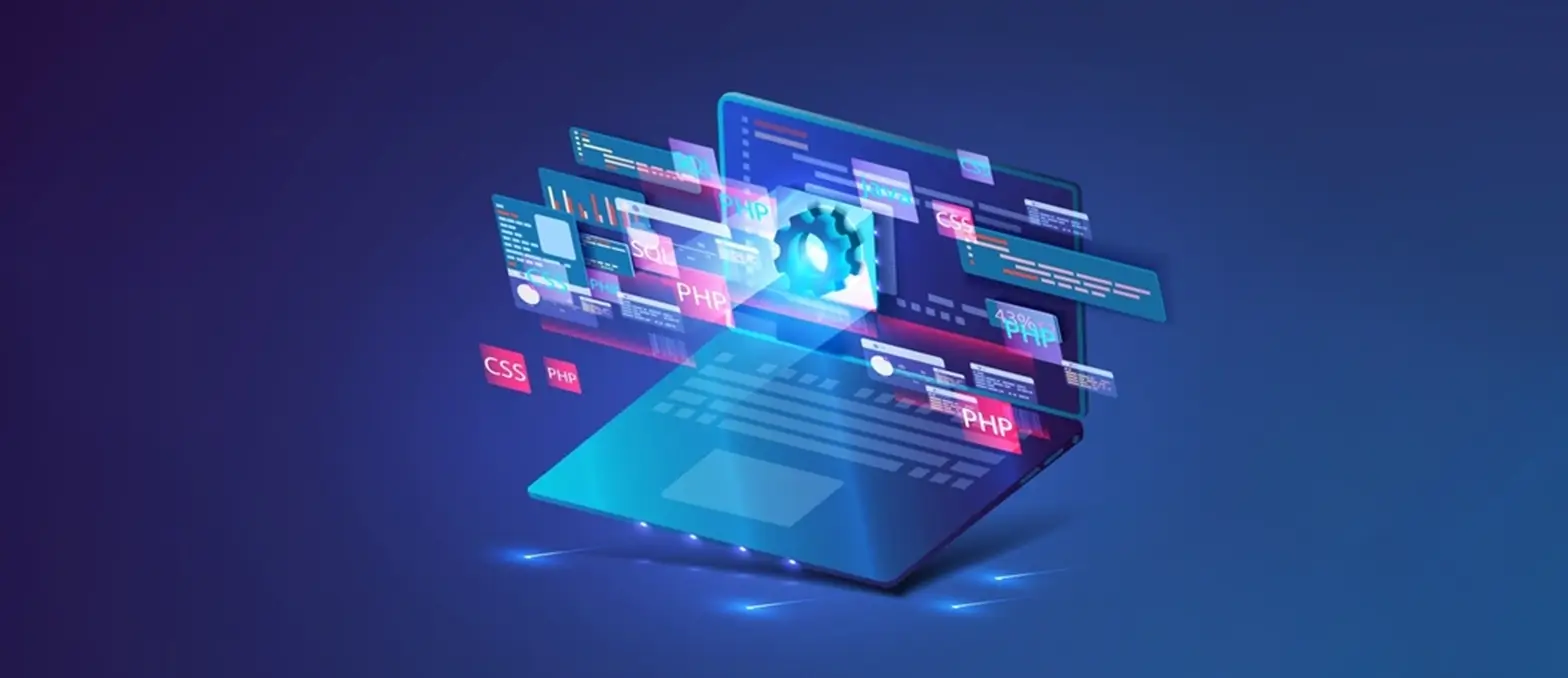The upgrades in today’s world are never-ending, it supports the industries to work better and faster. The continuous changing trends create a great impact on the working process and environment of the organizations.
Every company should have its own custom-built LMS in order to automate the learning process for their employees and provide them with a better understanding of their new training content. There are various IT consulting firms that work with the same motto of providing the best software services to the companies. This will help the enterprise in ensuring an effective workflow in the business, and an informed set of employees.
If you have a healthcare industry, and you are looking for a procedure to develop a custom LMS for your company, this blog will answer all your questions and help you in giving a clear view to developing the learning management system for the company.
Table of Contents
What Is A Healthcare LMS?
An LMS is software that is used to develop, track learning, automate the process, and deliver the content to the employees on time. It is a software application used for the administration, management, documenting, reporting, delivery of the course content, and automating the complete process.
LMS for healthcare is developed to help the medical practices manage all their learning programs provided to the students. The software allows its users to develop relevant training content for internal use by the medical staff and physicians. This system is offered by various IT outsourcing services, like the one ours, at A3logics you will find the best services which will help you grow.
This kind of well-implemented LMS will help a hospital in organizing the training courses, track learners’ progress, and also improve the overall learning experience. A strong and updated LMS will also help in reducing the cost of the total task.
At an open LMS, A3logics provides a healthcare LMS that gives you the flexibility you need to offer quality training content, track its compliance, and generate reports on all the employees and their departments.
Healthcare professionals are continuously learning as they upgrade skills and adapt to the new protocols and medical procedures and in order to complete the learning procedure without over involving HR. Healthcare software development services will help your organization to grow and prosper into a better and developed firm.
Three Technical Challenges Faced While Developing A Healthcare LMS
1. Technical requirements
Creating a healthcare learning management system is not an easy task, it takes 10% of planning, developing, launching, designing, and implementation and the other 90% is dedicated to the three challenges that a healthcare company faces.
The very first technical challenge faced by the industry is the requirements of data privacy laws. There are a number of data privacy laws that apply to the healthcare LMS, as it is also used to maintain the data of the patients for the purpose of research and clinical learning.
All the healthcare privacy laws have various technical requirements which you must stick to be compliant with the applicable laws. For example, data encryption is one of the technical requirements, so that you will have to encrypt the data of the patient you are managing.
The complication faced by the companies under this situation is that there are multiple laws and technical requirements, which leaves no choice but to have a dedicated compliance expert on board.
2. Messaging Standards
When doctors use your LMS for collaborative learning, they often interact via built-in chat, video calls, voice calls functions and share their clinical data with each other, in such cases to keep the integrity, security, and authenticity of the data in place. To follow such a rule, following the HL7, FHIR standards are important. the LMS should be developed only after following those standards.
HL7 is the health level-7 or health level seven international is an NPO with one aim to provide a structure for exchange, sharing, and retrieval of healthcare information electronically. The standards given by the organization are widely used across the globe and are proven to be effective.
It acts as a bridge between the healthcare department and IT department, giving the provider a smoother way to store and move the data in uniformity. It consists of a group of segments that are message codes used by the doctors and learners in the learning process.
3. EMR/EHR Integration
This is used when you have a skilled and advanced use case of letting the doctors discuss and learn in a collaborative manner, along with easy access to the patient’s clinical data. In such a situation, the department should integrate EMR/EHR with LMS.
By doing so, it becomes easy for the doctors to get access to all the data stored on EMR/EHR with LMS itself. It may sound easy, but the real challenge here is that healthcare and EMR/EHR are not made for each other, which suggests that there will be by default various issues that will affect the data sharing accuracy and efficiency.
After you have solved these technical challenges you will be set to have a world-class healthcare learning management system.
Below are the sleek methods to build your custom healthcare LMS
Steps To Create Your Own Custom Healthcare LMS
To start developing your custom LMS it takes a step-by-step procedure, as followed:
1. Identify Your Target Audience And Their Requirements
When you start to think of building a custom healthcare LMS, the very first step is to identify the audience who will be your target for the training offer.
When you look for your target audience, it is important to understand their needs and requirements while working on your idea of the LMS. The needs of your target audience are important and should be fulfilled by the learning management system you will be building up.
Once you have found your target audience it becomes easy for you to pick up on the idea of your healthcare LMS.
2. Find Your Competitors
You are not the only one who is building your custom learning management system, there are various other companies out there that are focusing on the same management as well. It’s a saying that if you know who your competitors are, then you are halfway there.
You should find your competitors in the market and make your strategies accordingly so that you are already a step ahead in the competition. Having competitors to compare from will help you in organizing your business in a more effective way.
3. Define Your Business Model
One of the most important steps in building a custom LMS is to define your business model. Having the right kind of processed business model will help you in maintaining the work management system in your organization.
Your business model will present your company and the idea associated with it, hence it is important to have the right kind of model, which will include ideas, designs colors, creativity, and other factors of a business model.
4. Finalize Your Idea
At first, when a company starts to think of preparing an LMS, they should have an abstract vision or a concept and the final task to clarify it. An organization should try to make it more understandable for their partner, and the development team.
A clearly defined idea for the healthcare industry will be more convincing for their investors, L&D, as it will help in getting the approval and funding from the directors, board members, and development team so that your healthcare company can have a perfect custom-built learning management system.
It is also recommended that along with finalizing your LMS idea, you should also select the target platform for your future services. Start by researching the market, analyze the potential competitors or your company’s need to develop just a web application or combination of web apps and mobile apps.
5. Identify The Features Set
When you get past three stages of defining your business model, finalizing your idea, searching for the target market, then the next step is to select the required features for your custom LMS.
You should be able to narrow down the set of features as much as possible, as they impact the overall cost of your learning management system. You must create an additional list of features that you will want to include in your system. Before moving on to the next step, consider factors for LMS development. This will help the development team to make the process for easier implementation of some additional features in the software update.
6. Choose Your Tech Stack
The development team will provide you with the kind of technology stack which will be based on the functions of the LMS. Along with the selected features, the technology stack will have an overall impact on the cost of the final cost of your product.
All the different operating systems require different tech stacks. That’s why it will be better to choose the most right target platform and add support for others at some point after the release.
7. Design And Structure
You should never underestimate the importance of website design, like UI/UX, it holds great importance in the process of making your final product. The process of learning is complicated enough for your agents, you do not want to make it more complicated by a bad design. As a convenient LMS will be more impactful on your agents and will help in prospering your real estate organization.
As a brand product, an LMS should include corporate colors. However, some colors and patterns can add strain to users’ eyes and make it difficult to concentrate on the screen. As a business owner, you should give attention to these factors of the software.
8. Plan An Audit
If you want your custom healthcare LMS to be on the marks before launch, with no errors, then you might want to think about planning an audit for your system in the organization.
Plan a successful audit which will make sure to thoroughly check your LMS and find out as many errors as possible and also find its solutions along with it.
9. Promote Your LMS
Ensuring the highest quality is crucial for your newly-built LMS. However, its release should also be accompanied by clever promotional activities to draw attention to the software product and showcase its benefits.
By using social networking a set of potential users can be prepared and counted days before the release of your LMS.
10. Launch The Software
If you have reached this step, it clearly suggests that you have successfully completed all the above-given steps, and now you are ready to launch your learning management system.
Launching your system with a proper and accurate process will help your LMS to perform better and faster. And it will also help in increasing your organization’s effective working.
11. Take User Feedback
After you have launched and promoted your LMS, the next step should be to start researching for user feedback on your software. The more it is used by the users in the healthcare industry, the easier it will be to collect their feedback and perform the next step accordingly.
Feedback will help the organization in keeping an eye on your LMS and make changes according to the users and their choices, which will make the system perfect for them.
If you have completed all these steps successfully, then it suggests that you have established a well customized LMS for your healthcare, which will now be used by the medical practitioners in order to provide training to their learners in the organization.
What Are The Features Of Healthcare LMS?
There are a number of features that drive an LMS, and they are a crucial part of the system that makes the working of the system successful.
Features of a healthcare learning management system are:
1. Upload Training Material – The foremost feature of any LMS is to be able to upload training material for the learner on the platform and provide access to everyone so that it is best used.
Uploading training material in the healthcare industry will involve data, course content of patients, special cases records, and medical content, to help the learners have complete and transparent knowledge about the content on the LMS.
2. Multiple File Format – This feature allows your system to have multiple file-formats under which there can be various files for various content which is delivered to the learners. Different files in the system will ensure that there is no mixing of the content and learners are easily grabbing it.
The feature suggests keeping your content in different rooms so that the learners can differentiate between the content they want and not. This will make the process of learning easy and filter the course as per the requirements.
3. Automated Grading – The LMS in a healthcare institution decreases the workload of the department, and this implies that the learning management system should be able to automate the grading process for the learners.
The automating process of the grading system helps the department in reducing the efforts of the HR department. So that they are not disturbed from their core duty which is taking care of the patients.
4. Create Tests And Surveys – The software should be able to create tests and surveys for the learners so that the organization can have an insight into the user’s experience and make changes according to them.
When the system creates tests and surveys for the learners it gives access to all the customers so that they can provide their feedback to the managers of the learning management system.
5. Tracking Progress And Reports – LMS of a healthcare organization has more responsibility as the department has a crucial duty in their hands, and along with it, they need to train their employees and provide them with certified course content.
After the content is provided to the learner, tracking their performance is very important, and providing reports of the progress of their learning experience. Your LMS should have this feature of tracking the progress and providing its report to the learners and department.
6. AI-enabled Suggestions – Your healthcare LMS should provide suggestions that are AI-enabled. Artificial intelligence improves the overall performance of the training program, along with automation and precision, which helps in increasing the efficiency of learning and development functionalities.
The LMS should give suggestions for content change, learning process, and more, which will help in ensuring an effective learning process.
7. Digital Locker For Clinicians – There should be a digital locker for the doctors, and interns, to keep their data safe in case of loss of any hardcopy. The lockers will ensure that the doctors know their data is safe and sound, and it can be accessed by them at any time.
Digital lockers make doctors feel safe about the information and data of their patients. It is very important in the healthcare industry to keep the data safe and private so that it can not be accessed by anyone.
8. Certifications – The learning management system should have the feature of offering certificates to the learners who enroll for the course or take up the training content. They should have automated certificates once they complete the course and the system should convey this to the department as well. In order to have the process at the right place.
9. Seminar Management – The system should be able to manage and remind the department for the seminar management, and also should create content for the same.
The management of the seminar should be well managed by the learning management system, as it has the ability to control the content presented in the seminar.
10. Access To EHR/EMR Data – The data is saved on the system so that it is safe and is not interrupted by anything, and your LMS should offer the feature of access to the EHR/EMR data.
By giving access to the encrypted data, your learning management system presents an effective image of your organization along with giving security to the clinicians and other learners.
Conclusion
This blog suggests that there are a number of LMS in the market used for different industries. Learning management systems are used in every company of every type, in a healthcare organization, it is important to have the right kind of custom LMS that will fit all of your requirements.
There are different features differently used in various companies for their purposes, a healthcare industry needs features that will empower its workflow and ensure an effective process.






